
knees before him, received from his hands a roll of papers, with which he
crossed over to the Commodore, and again falling npon his knees, delivered
it to him. The Dutch interpreter now asked “ what those papers were ? ”
to which it was answered, “ they are the imperial receipt.” The translation
of it is as follows :
[Translation of receipt given by the Princes of Idzn and Iwami to Commodore Perry.];
“ The letter of the President of the United States of North America,
and copy, are hereby received and delivered to the Emperor. Many times
it has been communicated that business relating to foreign countries cannot
be transacted here in Uraga, but in Nagasaki. Now it has been observed
that the Admiral, in his quality of ambassador of the President, would be
insulted by it ; the justice of this has been acknowledged ; consequently, the
above mentioned letter is hereby received, in opposition to the Japanese
law.
“ Because the place is not designed to treat of anything from foreigners,
so neither can conference nor entertainment take place. The letter being
received you will leave here.
[Here follow fac-similes of Signatures in Japanese."]
“ T h e NINTH OF THE SIXTH MONTH.”
The above is a literal translation from the Dutch, in which language the
conferences were held, and into which the receipt of the chief counsellors,
the princes of Idzn and Iwami, was, doubtless, badly translated from the
J apanese by their interpreter.
The following would probably be the correct translation from the
Japanese :
r The letter of the President of the United States of North America,
and copy, are hereby received, and will be delivered to the Emperor.
“ I t has been many times intimated that business relating to foreign
countries cannot be transacted here in Uraga, but at Nagasaki ; nevertheless,
as it has been observed that the Admiral, in his quality of ambassador of
the President, would feel himself insulted by a refusal to receive the letter
at this place, the justice of which has been acknowledged, the above mentioned
letter is hereby received, in opposition to the Japanese law.
“ As this is not a place wherein to negotiate with foreigners, so neither
can conferences nor entertainment be held. Therefore, as the letter has
been received you can depart.”
After a silence of some few minutes, the Commodore directed his interpreters
to inform the Japanese that he would leave, with the squadron, for
Lew Chew and Canton in two or three days, and to offer to the government
his services, if it wished to send any despatches or messages to those places.
The Commodore also stated that it was his intention to return to Japan in
the approaching spring, perhaps in April or May. Tatznoske then asked the
Dutch interpreter to repeat what he had said about the Commodore’s leaving
and returning, which he did, using the same words as before. Then the
question was asked “ whether the Commodore would return with all four
vessels ? ” “ All of them,” answered the Commodore, “ and probably more,
as these are only a portion of the squadron.” Allusion had been made to
the revolution in China, and the interpreter asked its cause, without however
translating to the Japanese princes, to which the Commodore dictated
the reply, that “ it was on account of the government.”
Yezaiman and Tatznoske now bowed, and, rising from their knees, drew
the fastenings around the scarlet box, and informing the Commodore’s interpreter
that there was nothing more to be done, passed out of the apartment,
bowing to those on either side as they went. The Commodore now rose to
take leave, and, as he departed, the two princes, still preserving absolute
silence, also arose and stood until the strangers had passed from their
presence.
The Commodore and his suite were detained a short time at the entrance
of the building waiting for their barge, whereupon Yezaiman and his interpreter
returned and asked some of the party what they were waiting for; to
which they received the reply, “ For the Commodore’s boat.” Nothing
further was said. The whole interview had not occupied more than from
twenty to thirty minutes, and had been conducted with the greatest formality,
though with the most perfect courtesy in every respect.
The procession re-formed as before, and the Commodore was escorted to
his barge, and, embarking, was rowed off towards his ship, followed by the
other American and the two Japanese boats which contained the governor
of Uraga and his attendants, the bands meanwhile playing our national airs
with great spirit as the boats pulled off to the ships. While there was some
little delay in embarking all the party, in consequence of the smallness of
the landing place, which was now flanked by some sixty or seventy Japanese
government boats, the soldiers took occasion to crowd in from various parts
of the shore, either to satisfy their curiosity, or to show a more formidable
front; and it must be confessed that, had such been the disposition of the
Japanese, there would have been no difficulty, with their large force, in completely
hemming in the Americans.